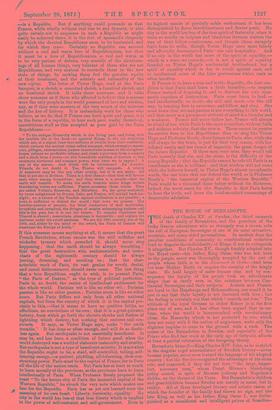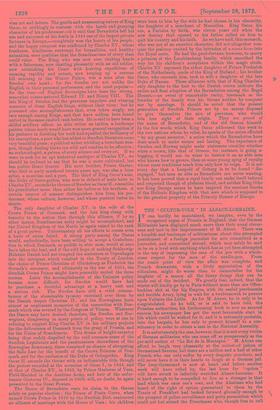THE HOUSE OF BERNADOTTE.
THE death of Charles XV. of Sweden, the third monarch of the family of Bernadotte, and the grandson of the lucky Gascon adventurer who so strangely won a crown, robs the roll of European Sovereigns of one of its most attractive, eccentric, and many-sided personalities. In modern days the peculiar conditions of monarchy in constitutional countries tend to disguise the individuality of Kings, if not to extinguish it altogether. But Charles XV., though frankly adopted into the Royal caste—his father, King Oscar, who was not born in the purple, never was thoroughly accepted by the sort of people whose faith is in the Almanach de Gotha—had been too near Mother Earth to acquire the serenity of the kingly state. - He held largely of mere human clay, and by con- sequence the loyalty of his people took an affectionate shape that is rarely seen in the relations between Con- tinental Sovereigns and their subjects. Austria and Prussia are loyal to the Hapsburgs and Hohenzollerns, nor would it be just to say that their loyalty is not leavened with love ; but the feeling is certainly not that which " casteth out fear." The attitude of the loyal German to either Kaiser is in the first place one of awe, and it has often been argued that in our time, when the world is honeycombed with revolutionary ideas, the Monarchy which is not protected by awe, which does not carry with it the notion of augustness, waits only the slightest impulse to come to the ground with a rush. The career of the Bernadottes in Sweden, and especially of the Prince who died last week at the early age of forty-six, affords at least a partial refutation of the foregoing theory.
Bernadotte himself—King Charles XIV. John, as he is styled in the singular regal nomenclature of Swedish history—never became popular, never even learned the language of his adopted country ; but the Swedes recognised the advantages of his stern rule, and respected, if they did not love, "the large, imper- fect, necessary man," whom Count Murner's blundering policy seated, in spite of Russian jealousy and Napoleon's dislike, on the throne of the Vases. But Bernadotte's children and grandchildren became Swedes not merely in name, but in reality. All of them developed literary and artistic tastes, of which the founder of the family had shown no sign, and the late King, as well as his father, King Oscar I., was distin- guished as a munificent and intelligent patron of Scandina-
vian art and letters. The gentle and unassuming nature of King Oscar, so strikingly in contrast with the harsh and grasping character of his predecessor—it is said that Bernadotte left his son and successor at his death in 1844 one of the largest private fortunes in Europe,—completely won the hearts of his people; and the happy conquest was confirmed by Charles XV., whose frankness, kindliness, contempt for formalities, and healthy animalism were qualities that the Scandinavians of every class could value. The King, who was now seen shaking hands with a fisherman, now chatting pleasantly with an old soldier, now astonishing his Court with hunting expeditions of amazing rapidity and extent, now keeping up a carouse till morning in the Winter Palace, was a man after the Swedes' own heart ; for the Swedes are not unlike the English in their personal preferences, and the most popular— for the time—of English Sovereigns have been the strong, somewhat coarse-natured Edward IV. and Henry VIII. The late King of Sweden had the generous impulses and winning manners of these English kings, without their vices; but he possessed also accomplishments that, even taken singly, are rare enough among Kings, and that have seldom been found united in the same exalted rank before. He is said to have been a skilful artillery officer, an able writer on tactics, a landscape painter whose merit would have won more general recognition if his patience in finishing his work had equalled the brilliancy of his conceptions, a poet who has added to Swedish literature some very beautiful gems; a political writer wielding a trenchant wea- pon, though dealing blows too wild and random to be effective ; an archasoelogist, a patron of every science and every art. If we were to seek for an apt historical analogue of Charles XV., we should be inclined to say that he was a more cultivated, but less politic Henri Quatre. His next brother, Prince Gustav, who died in early manhood twenty years ago, was also a born artist, a musician and a poet. The third of King Oscar's sons, the Duke of Ostro-gothia, who now in default of male heirs to Charles XV., ascends the throne of Sweden as OsearII., resembles his grandfather more than either his father or his brothers. A certain reserve of manner distinguishes him from his pre- decessor, whose culture, however, and whose poetical tastes he shares.
The only daughter of Charles XV. is the wife of the Crown Prince of Denmark, and the late king clung with tenacity to the notion that through this alliance, if by no other means, Scandinavian unity might be accomplished, and the United Kingdom of the North be again raised to the rank of a great power. Unfortunately all his efforts to create even a basis of union failed. A strong party among the Danes would, undoubtedly, have been willing to accept a Confedera- tion in which Denmark, so prolific in able men, would at once have taken the lead, and if the wild hope of making Schleswig- Holstein Danish had not tempted the statesmen at Copenhagen into the intrigues which resulted in the Treaty of London, the choice of Prince Christian of Gliicksburg as Frederick the Seventh's successor, and ultimately in the war of 1864, the Swedish Crown Prince might have peaceably united the three crowns. Later the accomplishment of the Unionist policy became more difficult, for Sweden would have had to purchase a doubtful advantage at a heavy cost and a serious risk. The Swedes have still a vivid remem- brance of the abominable tyranny exercised over them by the Danish despot Christian II., and the Norwegians have almost as unpleasant memories of the connection with Den- mark which was severed by the Congress of Vienna. Whatever the Danes may have desired, therefore, the Swedes and Nor- wegians, disagreeing in many points of policy, were at one in refusing to support King Charles XV. in his military projects for the deliverance of Denmark from the grasp of Prussia, and for the Union of Scandinavia. This dream of knight-errantry being thus rudely dispelled by the cold common-sense of the Swedish Legislature and the parsimonious shrewdness of the Norwegian democracy, there remained no chance of abrogating -the Salic Law for the benefit of the Crown Princess of Den- mark, and for the exclusion of the Duke of Ostrogothia. King Oscar II. ascends the throne with an indisputable title, though the protest recorded at the accession of Oscar I., in 1844, and at that of Charles XV., in 1859, by Prince Gustavus of Vasa, Field-Marshal in the Austrian Army, and heir of the unfor- tunate Gustavus IV., deposed in 1809, will, no doubt, be again presented to the Great Powers.
The House of Bernadotte rests its claim to the throne solely on popular election ; the Prince of Ponte Corvo, when named Crown Prince in 1810 by the Swedish Diet, contracted no alliance of marriage with the House of Vasa ; his children were born to him by the wife he had chosen in his obscurity, the daughter of a merchant of Marseilles. King Oscar, his eon, a Parisian by birth, was eleven years old when the new destiny that opened to his father called on him to quit his country and his faith. As we have said, this monarch, who was not of an assertive character, did not altogether con- quer the jealousy excited by the intrusion of a novus homo into the Royal caste. He had the good-fortune, however, to marry a princess of the Leuchtenburg family, which smoothed the way for his children's acceptance within the magic circle. Charles XV. espoused the eldest daughter of Prince Frederick of the Netherlands, uncle of the King of Holland ; his brother Oscar, who succeeds him, took to wife a daughter of the late Duke of Nassau. These alliances with that of King Charles's only daughter to the heir to the Danish crown indicate the entire and final adoption of the Bernadottes among the Regal Houses,—an event of remarkable rarity, inasmuch as the founder of the family won his throne neither by conquest nor by marriage. It should be noted that the present generation of Swedish Princes are by no means disposed to give themselves the airs of parvenus, who would fain lose sight of their origin. They are proud of the name of Bernadotte, and of the old Gascon himself. In the few words which King Oscar addressed this week to the two nations whom he rules, he speaks of the union effected "by my great ancestor," a union which the Bernadottes have done much to make secure and lasting. The experience of Sweden and Norway might make statesmen consider whether when a crown, like that of Greece, for instance, is going a- begging, it would not be wiser to bestow it on an able man who knows how to govern, than on some young sprig of royalty whose caste traditions teach him only how to reign. It is not every day that a Leopold of Coburg is to be found "die- engaged," but men as able as Bernadotte are never wanting. It has been proved that a royal family can make itself beloved and respected though of plebeian blood, and neither King Otho nor King George seems to have inspired the esurient Greeks of the Hellenic Kingdom with that awe which is supposed to be the peculiar property of the Princely Houses of Europe.



































 Previous page
Previous page